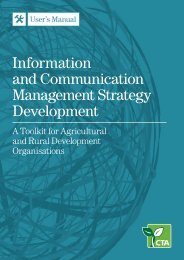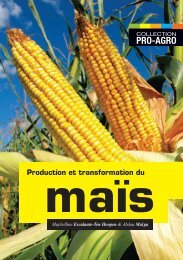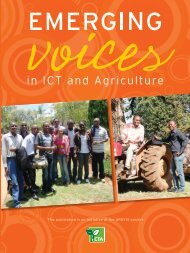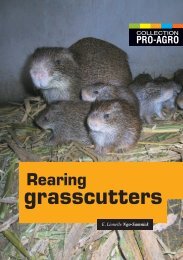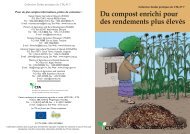Policy framework for Pastoralism in Africa
Policy framework for Pastoralism in Africa
Policy framework for Pastoralism in Africa
- No tags were found...
You also want an ePaper? Increase the reach of your titles
YUMPU automatically turns print PDFs into web optimized ePapers that Google loves.
--enactment of new and revision or repeal of exist<strong>in</strong>g pastoral-related legislation;--further dissem<strong>in</strong>ation of <strong>in</strong><strong>for</strong>mation to the public, tra<strong>in</strong><strong>in</strong>g and capacity build<strong>in</strong>g to supportimplementation.Stakeholder consultation will provide the opportunity to <strong>in</strong><strong>for</strong>m and sensitize pastoralists on theimportance of the pastoral policy development process which requires their active participation. Itis crucial that political commitment to the pastoral policy development and implementation is secured.5.3 Strategies <strong>for</strong> pastoral policy developmentThe strategies <strong>for</strong> the revision or development of pastoral policy mirror many of the strategiesdescribed under Objective 1 of the <strong>framework</strong>.5.3.1 Clarify<strong>in</strong>g roles <strong>in</strong> pastoral policy developmentSusta<strong>in</strong>able pastoral policy development and equitable access to pastoral resources, (ma<strong>in</strong>ly pastoralland and water) <strong>for</strong> the benefit of pastoral communities are the central issues that any pastoralpolicy should adequately address. The first <strong>in</strong>gredient <strong>for</strong> successful pastoral policy developmentconsists of recogniz<strong>in</strong>g the <strong>in</strong>terests and roles of all stakeholders <strong>in</strong> the pastoral sector. The stakeholdersare not limited to pastoral communities and their <strong>in</strong>digenous <strong>in</strong>stitutions but also <strong>in</strong>cludethe public at large and civil society organizations (CSOs) and they need to be identified and <strong>in</strong>cluded<strong>in</strong> the pastoral development process.5.3.2 Recogniz<strong>in</strong>g the role of <strong>in</strong>digenous <strong>in</strong>stitutionsRecogniz<strong>in</strong>g the legitimacy of and improvement on the roles and operations of <strong>in</strong>digenous powerstructures, <strong>in</strong>stitutions and rights regimes on pastoral resources <strong>in</strong> pastoral communities (pastoralresource related to conflict resolution systems, <strong>in</strong>ter-tribal peace agreements permitt<strong>in</strong>gtranshumance across tribal land boundaries) as well as provid<strong>in</strong>g a necessary <strong>in</strong>terface betweenthem and state-led systems of pastoral resource development and adm<strong>in</strong>istrations are importantpre-requisites to ensure ownership of the pastoral policy and its successful implementation.Issues of equal and secured access to pastoral resources, and representation on all structuresthat are responsible <strong>for</strong> pastoral resource development and adm<strong>in</strong>istration should be addressed.This is of paramount importance <strong>for</strong> gender balance because many <strong>in</strong>digenous power structures<strong>in</strong> pastoral communities do not allow any or sufficient women’s participation <strong>in</strong> deal<strong>in</strong>g withissues related to access to pastoral resources. In addition, the empowerment of decentralized<strong>in</strong>stitutions <strong>in</strong> the adm<strong>in</strong>istration of pastoral resources should be emphasized <strong>in</strong> the pastoralpolicy development.5.3.3 Consultation with pastoral communities and engagement withcivil society organizationsAdequate preparations must be made <strong>for</strong> an <strong>in</strong><strong>for</strong>med consultation with pastoral communitiesand their organizations on the major issues to be addressed <strong>in</strong> the pastoral policy. All categoriesof pastoral stakeholders, especially women and the youth, should be <strong>in</strong>volved and there shouldbe a look out <strong>for</strong> the dom<strong>in</strong>ance of established <strong>in</strong>stitution and <strong>in</strong>terest grouts and elim<strong>in</strong>atetendencies of <strong>in</strong>timidation of pastoralists dur<strong>in</strong>g consultation meet<strong>in</strong>gs.Secur<strong>in</strong>g, Protect<strong>in</strong>g and Improv<strong>in</strong>g the Lives, Livelihoods and Rights of Pastoralist Communities43




